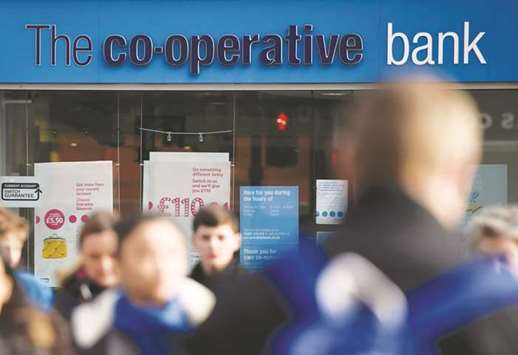Britain’s Co-Operative Bank reached an agreement with investors on a £700mn ($898mn) recapitalisation plan, enabling the UK lender to avoid being broken-up by regulators. The deal will involve a debt-for-equity swap for junior bondholders to raise £443mn, while £250mn of new shares will be sold, the Manchester, England-based bank said in a statement yesterday.
The bank will split its pension programme from the Co-Op Group supermarket chain. Co-Op Bank’s recapitalisation helps the 145-year-old company avoid a similar fate to Spain’s Banco Popular Espanol, which lost its independence in a fire sale directed by regulators earlier this month.
Four years after authorities identified a capital shortfall, the lender is plotting a path to mediocre profitability by 2021 with the support of bondholders.
“The board is pleased to confirm this proposal for a recapitalisation which will mean that the Co-Op Bank can continue as a viable stand-alone entity,” chairman Dennis Holt said in the statement. “Our investors share our commitment to building our distinctive ethical franchise and see strong future growth potential for the Co-Op Bank.”
The recapitalisation proposal has support from 47% of junior bondholders and 52% of shareholders, including Co-Op Group.
The lender’s institutional junior debt investors will get shares representing about 17.4% of a new holding company. Consumers owning the bonds are expected to get about 45% of the nominal value of their 2023 notes, subject to an overall cap of £13.5mn.
The bank will also sell about £250mn of new shares in a process due to complete by the start of September.
The Co-Op Group’s stake in the bank will fall to 1% from about 20%, meaning it will lose the right to nominate directors to the company and the promotion of the bank’s services to its customers will “naturally fall away and come to a formal end in 2020,” according to the statement.
The Bank of England’s Prudential Regulation Authority said in an e-mail that it accepted the bank’s plan to build greater financial resilience and “will remain closely engaged with the bank while the actions announced today are taken forward.”
The deal comes after the bank on Monday scrapped plans to sell itself and said it’s pushing for a “mid-single digit” return on equity, a measure of profitability, within four years. That’s below targets of at least 10% set by other major British lenders. Co-Op Bank has said it doesn’t expect to pay a dividend until at least 2021.
Co-Op Bank’s debt investors – which include Silver Point Capital, GoldenTree Asset Management, Cyrus Capital Partners and BlueMountain Capital – had pushed to extricate the bank from the Co-Op Group’s retirement plan.
That’s partly because the burden of the pensions programme could have made it harder to sell the lender as a standalone operation in the future, according to people familiar with the matter.
The pension fund will be split into sections under the same plan so that 21% of the assets and liabilities will be allocated to the bank, while removing the lender’s obligations to support the group’s commitments to former staff.
Co-Op Bank will provide £100mn over 10 years in deficit recovery contributions to the programme, while it’s also committed to provide initial collateral of £216mn from the point of separation.
Bank of America Corp, UBS Group AG and Houlihan Lokey Inc are advising the Co-Op Bank, while Paul Taubman’s PJT Partners is acting for the bank’s leading bondholders.

People walk past a branch of the Co-operative Bank in London. The bank has reached an agreement with investors on a u00a3700mn recapitalisation plan, enabling the UK lender to avoid being broken-up by regulators.
